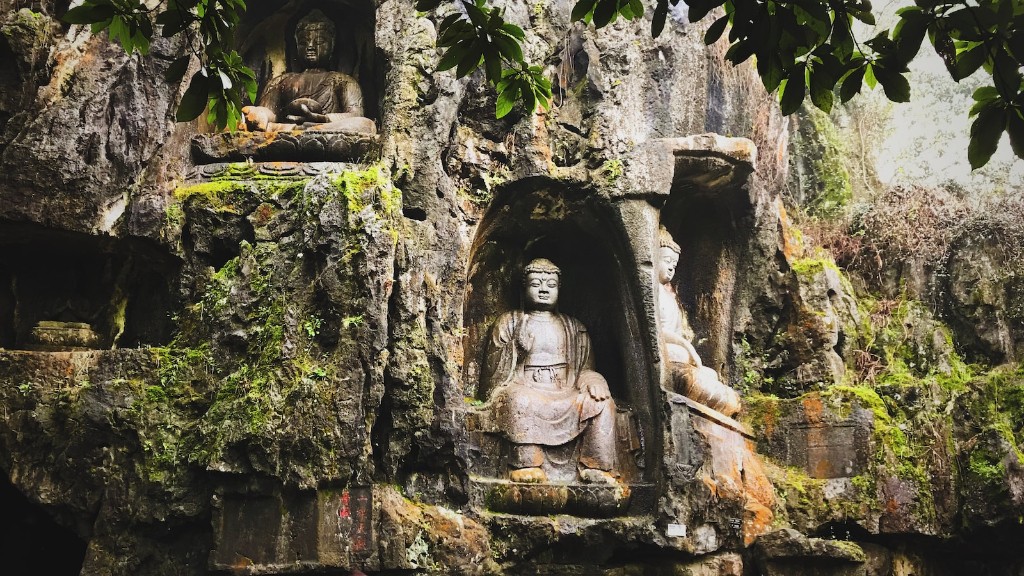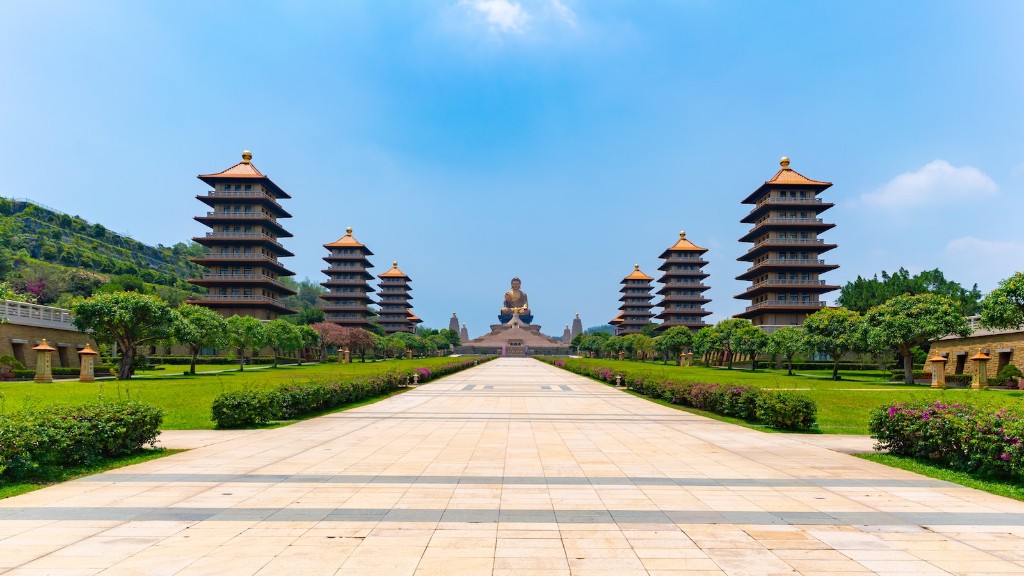Hinduism is one of the oldest and most widely practiced religions in the world, with an estimated population of over 1.2 billion people. As a religion and cultural system, Hinduism is unique due to its emphasis on the spiritual sacredness of all living beings, the centrality of the Vedas and other scriptures, the belief in karma and reincarnation, and its worship of multiple gods and goddesses. Hinduism has often been described as a “way of life,” reflecting the fact that it reflects the inner spiritual quest of individuals as well as the larger cosmic cycle of all mankind. As such, Hinduism, while designated as a religion, also serves as a comprehensive system, providing ethical and moral guidelines for living.
Hinduism’s sacred writings are known as the Vedas and are composed of four ancient texts, known as the Atharva-Veda, Rig-Veda, Yajur-Veda and Sama-Veda. These texts, traditionally composed in Sanskrit, contain mantras, hymns, liturgies and teachings. They are considered the foundation of Hinduism and are seen as divinely inspired.
The Vedas are thought to have originated from the goddess Sarasvati, the Hindu deity of learning, knowledge, and the arts. In addition to the Vedas, Hinduism also has a vast collection of other sacred writings, known as the Upanishads. These texts, most of which were composed between 800 and 500 BCE, focus on philosophical, metaphysical and spiritual matters, many discussing the concept of Brahman, the divine essential reality of the universe.
Apart from the Vedas and Upanishads, Hinduism also includes the Bhagavad Gita, a moral and spiritual guide book that has become one of the most influential tracts in Indian culture. This text, which is often compared to the teachings of Jesus in the Bible, discusses many of the fundamental teachings of Hinduism, including the doctrine of karma, reincarnation and the unity of all existence.
The Ramayana, another revered Hindu text, chronicles the story of the God Rama and follows his quest to save his wife and kingdom. The Bhagavata Purana is an important devotional religious text that covers the life and teachings of Lord Vishnu and Krishna. Other sacred texts of Hinduism include the Mahabharata, a vast epic that revolved around a legendary battle between two branches of a ruling family, and the Tantras, which are texts related to primitive and esoteric mysticism.
The sacred scriptures of Hinduism serve as an essential source of knowledge and guidance for Hindus, providing ethical, moral and spiritual direction. Hindus look to the Vedas for guidance on how to live in accordance with the divine laws of cosmic order. Through their teachings, Hindus strive to become one with Brahman, the formless, eternal and all-encompassing reality that underlies the material universe.
Devotion to the Vedas and other sacred scriptures is an essential part of Hinduism. Devotees engage in daily reading, chanting, and meditation in order to better understand the divine truths revealed by the scriptures. By immersing themselves in the Vedic teachings, Hindus seek to deepen their spiritual connection with the divine.
Visual Representations
Visual representations have been an important part of Hinduism since ancient times. Hindus use visual images to represent and venerate the divine, to inspire religious devotion and to serve as reminders of spiritual truths.
In Hindu temples, one can find elaborate sculptures of the Hindu gods and goddesses. These sculptures are often done in intricate detail and can be accompanied by visual displays of scenes from Hindu epics and mythology, such as the Ramayana.
In homes, Hindus often keep small statues of the gods and goddesses, such as Ganesha, Shiva, or Lakshmi. These objects are a constant reminder of the divine presence in all aspects of life. Hindus also use paintings, such as the Puja Mandala, to focus on spiritual meditation and prayer.
Visual representations are an important way for Hindus to connect with and venerate the divine. The visual symbols act as gateways for the Hindu devotee to enter into spiritual realms and contemplate the deeper mysteries of existence.
Rituals
Rituals play an important role in Hinduism. Hindus believe in performing rituals as a way to express devotion and honor to the divine. Rituals can include offering prayers or devotional songs to the god or goddess, or engaging in elaborate worship ceremonies (pujas). Hindus may also perform rituals to mark special occasions in their lives, such as births and marriages, or to commemorate events honoring ancestors.
The Vedas and other sacred texts contain instructions and guidelines for performing rituals, such as the details of how to construct a proper altar and the types of offerings that should be made. Rituals can be performed alone, in family settings, or in large group settings, typically in temples and holy sites.
Rituals are seen as powerful ways for Hindus to invoke the presence of the divine, to ask for specific blessings, or to prepare for deeper spiritual undertakings. Through their performance, Hindus seek to make tangible their devotion to the gods and goddesses, to better comprehend the sacredness of the universe, and to foster a sense of oneness with the divine.
Festivals
Festivals are another important component of Hinduism. Hindus traditionally celebrate festivals to honor the gods and goddesses, to mark special occasions in the year’s calendar, or to commemorate specific religious events.
Major Hindu festivals include Diwali, Navaratri, and Holi. Diwali is a festival celebrating the return of the deity Rama from exile in Lanka, and is associated with the goddess Lakshmi and the celebration of wealth and success. Holi is a colorful festival celebrating the triumph of good over evil and is celebrated by the throwing of colored powders. Navaratri is a nine-day festival honoring the feminine aspect of the divine and its manifestation in the form of the goddesses Durga, Lakshmi and Saraswati.
Festivals are an important part of Hindu culture and life. They are a time of joy and celebration, when Hindus gather together to honor their gods and goddesses with music, dance and prayer. Through their celebration, Hindus seek to invoke the presence of the divine, to let go of negative emotions, and to embrace the sacredness of life.
Pilgrimage
Pilgrimage is an important part of Hindu practice. Hindus often take pilgrimage trips to holy sites both within India and around the world. These can include sites associated with specific Vedic deities (such as Lord Shiva in the Himalayas or Lord Krishna in Vrindavan) or places associated with certain blessed spiritual masters.
By embarking on a pilgrimage, a Hindu devotee seeks to deepen their spiritual understanding and experience the presence of the divine. Pilgrimage is seen as a way for a Hindu to test their commitment and devotion to the path of spiritual realization. It can also serve as a symbol of making a transition from the material to the spiritual world.
Pilgrimage is often combined with prayer and meditation, as well as the chanting of mantras and religious songs. By engaging in spiritual activities during a pilgrimage, Hindus seek to gain a deeper insight into divine truths and to open themselves up to direct spiritual experience.
Yoga
Yoga is another vital aspect of Hinduism. Yoga is seen as a means for calming the mind, soul, and body, and for achieving union with the divine. Through their practice of yoga, Hindus strive to strengthen the mind, body and spirit in order to achieve a state of tranquility and peace.
The Vedas and other sacred texts of Hinduism contain instructions and guidance for mastering the yogic arts. Practicing yoga involves engaging in asanas (yoga postures), pranayama (breathing practices), and various meditative techniques. By doing so, a person can become more aware of the divine presence within and can access deeper and more profound spiritual states.
Yoga is seen as a sacred science and an essential part of Hindu practice. It is believed that through their practice of yoga, a person can experience the highest spiritual awakening and become one with Brahman, the divine essence of reality.


